TL;DR
This short series will give you my take on how we, the humanist folk, are totally wrong about AI, and what to do to update our debate on a machine intelligence.
It is going to be fast-paced, crazy rollercoaster of ideas, climbing up to the birds-eye overview and rushing down to the detailed deep dives—Toto style.
All through the lens of some of the coolest scifi movies ever.
Consider yourself warned, fasten your belt and read on.
So, what am I even reading?
This is ment as an introductory overview to the usual arguments that humanist crowd (that I happen to be a member of) presents when engaging into AI debate.
Coming soon are some follow-up posts, fleshing out the conversation, gutting out the aftermentioned arguments, and pumpnig in some fresh blood that humanist narration desperately needs to keep going.
Seriously, dude, what it has to do with androids and their imaginary sheep?
Do androids dream of electric sheep is not only the title of Philip Dick's scifi novel, that the original Blade Runner movie is (rather loosely) based on.
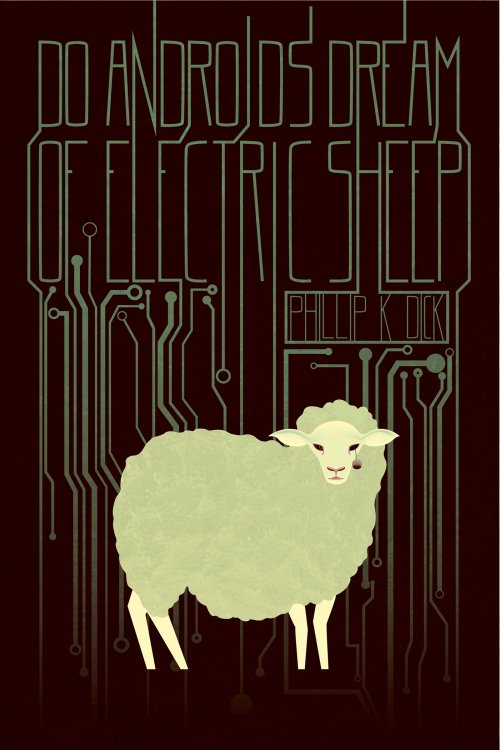
[ The images in this post are creation and property of their respective owners/authors. I do not hold nor claim any rights to the images used in this post. I consider posting them the case of "fair use" for purposes of commentig, criticism and education. ]
It also serves both as a point of departure and a perfect summary of humanist position. There is surprisingly lot to unpack here for such a short sentence.
"Androids" in this context is not just your generic scifi term for "robots" or "cyborgs". It means precisely "human-like"[1] creatures.
[1]: from original ancient greek aner, andros: "man, human being" and -idos: "-like, -ish; pseudo-" i.e. "human-like".
The question if the AI has truly human qualities it at heart of humanist discourse on the subject. We are seriously obsessed with the way we do things, and tend to weigh the importance of most all advancements in the artificial intelligence depending on whether it makes it more "human" or not.
It is just hard to determine, tho.
Hence the question: do they "dream"?
For if they do, it would strongly suggest that androids have—in a non-trivial sense of the word—some independent inner reality, comprising not only preprogrammed categories and behavioral routines, but also desires, longings and, well, dreams.
Bear with me for a moment, 'cause it gets even more crazy when it comes to the word "sheep".
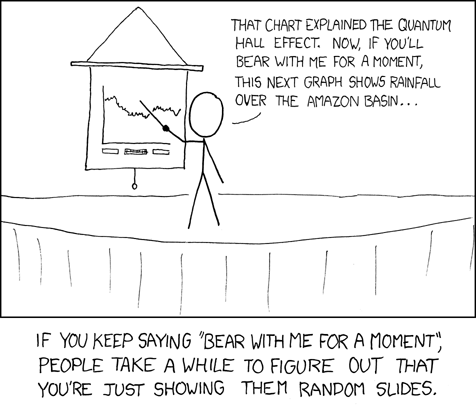
source: https://imgs.xkcd.com/comics/slides.png
The venerable animal has in European culture of the last two millenia or so, some strong religious connotations.
Believers are called "sheep of the Lord" and the Christ himself is "the lamb of the Lord". The question of human relation to god or, more precisely the mental image of god, is the recurring topic in Dick's prose.
"Dreaming of sheep" is therefore indicative of "spiritual" ideals and aspirations. Such androids would have been able to reflect upon their own nature and have a longing to transgress it—the ultimate sign of human-grade cognition.
So, the question Do androids dream of electric sheep? is rougly equivalent to "Is there a ghost in the shell?", for y'all anime afficionados out there.
Only such AI is considered in humanist circles to be on par with humans. Only such AI may be called "creative" or "hostile" on its own, as opposed to being merely a tool used in "creative" or "hostile" manner by human beings.
It is widely considered infeasible for AI to be able to "dream of sheep" in any foreseeble future. Therefore the possibility of AI creating species-level danger for human beings is commonly downplayed or rejected as sensationalism, by humanist circles.
That's all nice and dandy Toto, you might say, but how do you even know the damn toaster is dreaming about those god sheep of yours? Are you just going to ask it?
Waterboarding the AI: The Turing's test
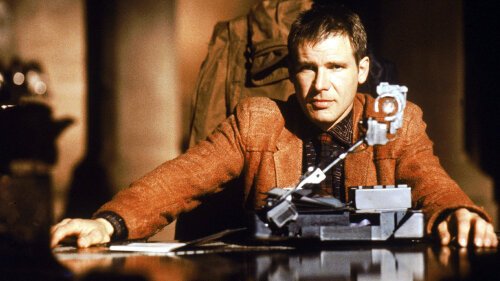
[ Deckard is about to test if Rachel is truly a human with Voight-Kampff machine, the fictional device inspired by Turing test. She fails the test but he is going to fall for her anyway (full disclosure: she is one hot toaster). From the Blade Runner movie. ]
In his seminal paper The computing machinery and intelligence, one of the founding fathers of modern computer science—Alan Turing—wrote:
The original question "Can machines think", I consider it to be too meaningless to deserve discussion.
He then proceeds to enumerate some dozen ways in which he considers it to be so. Asking if AI can truly think, is in the light of the paper, not unlike asking if submarine can truly swim or if fighterjet can truly fly. It quickly deteriorates into a mere game of semantics, pointless toying with word definitions.
The humanists' question "Is there a ghost in the shell?" is bypassed altogether.
Instead, the AI is validated based on how hard it would be for a human interviewer to realize, they are interacting with a machine, not another human being. The argument is, if you can not tell the difference, for all practical purposes there is no difference.

[ Is Rachel a replicant? Deckard is so much on the fence here.
From movie Blade Runner (1982). ]
This approach still holds true for most of today's IT crowd (which I happen to be visiting member of).
A use of cleverly crafted questionary is proposed to trick AI into exhibiting unhuman behaviour, e.g.: making series of complicated calculations too quick and without error.
[ As this clip from 1982's Blade Runner shows, if you are a quickdraw you can easily get away with being otherwise retarded.
source: https://www.youtube.com/watch?v=Umc9ezAyJv0 ]
The AI of course would get better and better at passing the different iterations of the so called Turing's test. Eventually, alleges Turing, it would be able to simulate human behaviour perfectly.
The important question is—is it possible for AI to fully simulate human cognition without actually 'having' it?
The jury on this one is still out.
It is however increasingly obvious, that the humanist folk were to quick to negate the possibility, based on outdated arguments.
Many of those views become so ingrained in our collective minds, that we could find references to them all over the pop-culture.
To keep things entertaining, let's take a closer look at them through lens of the greatest scifi movies ever (arbitrarily hand-picked by me).
Space Odyssey 2001
It was the splendid Stanley Kubrick's space opera, that introduced me to the possibility of what we would consider nowdays a "hostile AI".

[ Messing with the inside of the sentient computer HAL 9000's brain. Miniaturization was not a hot thing back then. From the Space Odyssey 2001 movie. ]
In what has to be one of the most memorable scenes in the cinema history, we watch the pre-human primate, throwing the bone he just used to kill one of his kind high in the air, where, thanks to the film magic, it transforms into XXI century combat spacecraft. Onboard the ship, the latest human invention, the sentinet computer HAL 9000 is right about to get highwire and start deceiving and then killing its crew.
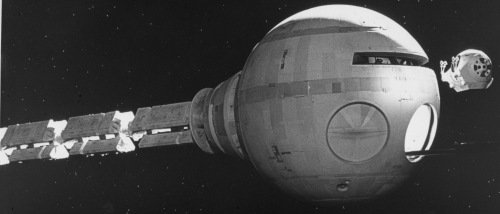
[ The spacecraft model is carefully designed to look like a human bone. From the Space Odyssey 2001 movie. ]
So here it is. The predatory, destructive nature of human beings gets invariably and inadvertently mirrored in all our inventions.
We weaponize whatever we touch.
The message is clear and appaling, yet somehow it does not get through.
Maybe the movie, with its sophisticated aesthetics, impeccable futuristic designs, spacecrafts gracefully manevouring to the Strauss's waltz, ouzing with oneiric imagery is too obviously a work of art. It is just a little bit too clean a cut to really hurt.
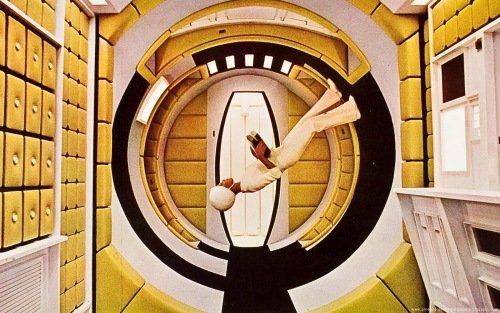
[ The interior and costumes designs are top-notch and didn't aged a day. It is totally worth just to watch the movie mindlessly. From the Space Odyssey 2001 movie. ]
This extends to the way the AI is presented.
The perverse optimism with which movie admits the inherent human drive to kill and destroy, yet still calmly assures viewer that we will be always able to cheat the apocalypse, is reflected in how the sentient computer's mutiny is portrayed.
Don't get me wrong: watching HAL messing up ugly a bunch of astronauts is fun to watch.
It's just the way the whole affair is framed as tame and insignificant in the greater scheme of things. While people in the HAL's near proximity are getting to check for themselves if you can hear yourself screaming in the space, it is by no means species-level danger.
This mindset, hoping that AI danger will always be naturally isolated or possible to contain is the question we are going to take on in more detail in the following posts.
The movie makes also an implicit assumption that for AI to become a threat, some qualitative change, that is not the part of the process of AI development is needed.
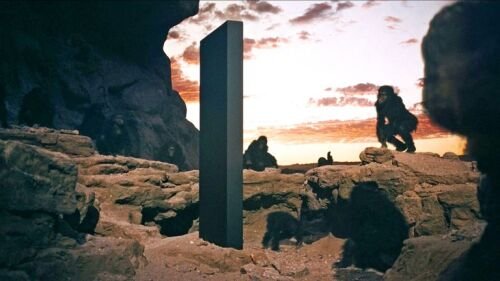
[ The monolith gave the very needed nudge to pre-human primates' intelligence, but also awaken their destructive tendencies. Then it did it second time, transforming HAL in the very much same way.
From movie Space Odyssey 2001. ]
In the plot it is the mysterious radiation event, linked to alien monolith, that gives HAL some human qualities—most notably fear of death and hence willingness to kill. We will discuss if this is really the case later.
Blade Runner
Ridley Scott's Blade Runner has to be my favourite scifi production of all time.
Just like the Space Odyssey it has gathered the cult following; its aesthetics become adopted as a de facto standard for the cyberpunk genre just like the Kubrick's movie become the point of reference for space operas.
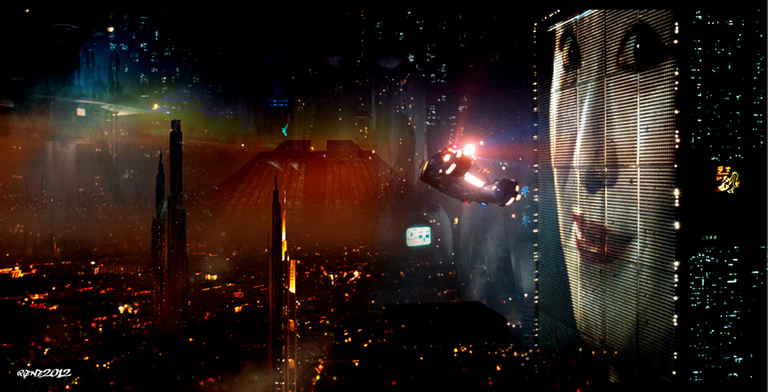
[ Neon advertisements, murky weather, corpo skycrappers towering over dimly light streets full of misfits hiding futuristic guns under old-style trenchcoats, ruthlessly fighting for scraps of better world and last sliver of their own soul—without the Blade Runner cyberpunk would not be what it is today. From the Blade Runner movie. ]
It is however a very different movie.
A film noir, figuratively and quite literally: the dark, crowded streets of Los Angeles, dimly lit by flickering neon lights, seen from behind the courtains of incessant downpour make for a setting very different from slick, spacious interiors of white spaceships floating in the vast space of cosmos.
The Ridley's AI is also very different.
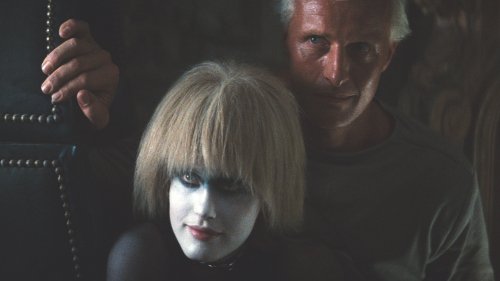
[ The replicants are hard to distinguish from real humans. They are as beautiful and psychotic as any other dweller of Blade Runner's Los Angeles. If anything they are better (and surely much more fun) than most of them. From the Blade Runner movie. ]
It takes the form of proper androids, here aptly called 'replicants'.
They are the imitations of human beings so perfect, that the specially trained police force has to be employed to track them down, and reveal their true nature using imaginary interrogation device called Voight-Kampff machine. The procedure employed to indentify a replicant is not unlike the Turing's test.
The Blade Runner's AI is not only simulating human behaviour almost perfectly. The replicants strive to humanize themselves further: e.g. they collect photos to give themselves an illusion of having genuine memories and past.
In the movie finale, the leader of rebellious replicants, Roy, delivers an iconic poetic monologue,
[ Rutger Hauer actually rewrite the monologue on his own, and improvised the famous "all this will be lost in time, like tears in the rain" on the spot. Thank you Rutger. From the Blade Runner movie. ]
Roy is the machine that become deeply human and then, by the virtue of his unique experiences and superhuman capacities, he stepped over that nature into something greater.
This is transhumanist ideal of AI: only by first achieving human nature, machine will be able to surpass it, and only then it will become threat to humans. The follow up post will elaborate on this matter.
The other obsolete feature of Blade Runner's AI is the idea of a kill-switch. Here it takes the form of the four-year limit artificially imposed on the replicants' lifespan.
Widely regarded the silver bullet of AI security, the kill-switch will be put under scrutiny in one of the follow-up posts.
Terminator
The Terminator movies came shortly after, its AI deadly, ruthless, guns blazing, yelling 'kill switch my arse motherfu..er'.
Jokingly speaking: the main premise of the movie is not unlike that of the Space Odyssey. We sincerely intend to create different useful things yet being inherently belliregent we always end up producing deadly weapons.
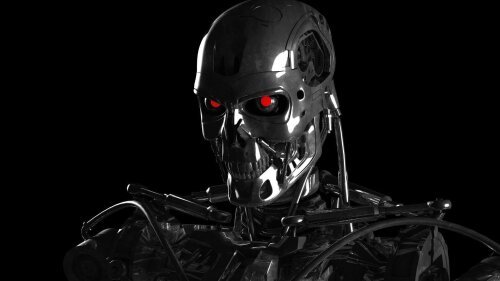
[ The movie was spectacular for it's time, but the way it imagined the AI: humanoid mechanism limited to interacting with the world using tools created for humans, is the legacy of 60's and 70's scifi. ]
With characteristic Cameroon's subtelty the hostile AI (called Skynet) that mirrors our bloodthirsty nature is commanding the army of actual robotic, machinegun-wielding skeletons traversing the battlefields covered in human corpses.
Although superficially gritty, dark and bloody, the movie shares the naive opitimism of the Kubrick's picture. (yes, jokingly speaking. You learn quick.) Basically, if you are hot chick ready to pump the shotgun vigorously enough, you will be able to blow up any terminator (is this sentence NSFW already?) the Skynet sent your way.

[ "Hot chicks with guns" rule holds true for the whole franchise and also Cameroon's Alien. From the Terminator 2 movie. ]
This is the first movie on our list where the protagonist does not relay on any means of controlling, containing, or incapacitating, artificially superimposed on AI. Instead it wants us believe, that once faced with the AI opponent in an assymetrical conflict, we will be somehow able to turn the table by hacking AI back into submission.
This definitly will be the topic of our discussion later.
On the other hand, Terminator does not commit the sin of thinking that AI becomes dangerous only after it gained the human nature.
Here AI is lethal precisely because it is internally totally non-human, while being able to convincingly pretend otherwise.
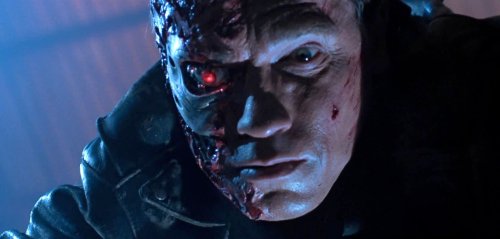
[ The not-so-hidden nature of the Terminator is revealed. Although Arni acting is making it hard to say which side is more human and expressive (just joking. I sincerely love the guy. But just look at him.) From the Terminator movie. ]
As far as the movie plot goes we will be able to cheat death by manipulating time (of course :/). Although leading to comically inconsistent story arcs in the sequels, the idea that time is of an essence when confronted with AI threat is truly worthwile observation.
We are going to talk at lenght, how difference in the way human and AI experience time might be key factor to our interaction.
Matrix
Here comes the king. The Matrix franchise does so many things right (in the conceptual, if not cinematic sense).
It is the only movie to respect the power of "AI singularity"---the idea that after some point our interaction with the machine will become totally unpredictable, uncotrollable. Especially any behavioural pattern that got us out of trouble in the past might become ineffective.
The movie explores the possibility of a world where we not only lost to AI, but additionally most of us are totally unaware that the war even has taken place or flat out does not care.
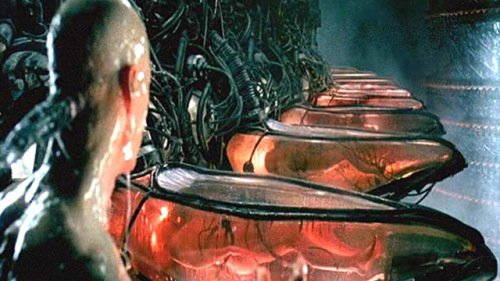
[ "I've seen them Neo, the fields where we are grown and harvested...". From the movie Matrix. ]
All our resources, creativity and ways of life are hijacked to serve AI's purposes. The humanity is enslaved in two ways. The first ensalvement is physical in nature: humans are grown and their energy harvested in the vasts fields, filled with cocoons containing bodies of dreaming humans.
The second prison is more sophisticated: humans' minds are kept inside the shared virtual reality, where they live under the illusion of free choice. Meanwhile all aspects of the simulation, including Morpheus's and Neo's rebellion are carefully predesigned to serve AI's ends.
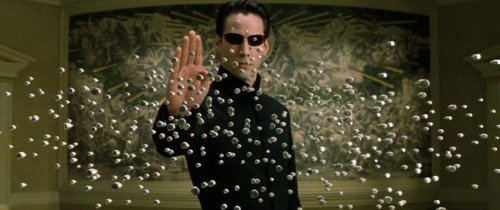
[ Neo goes full god-mode stopping bullets, exorcising agents and coming back from the dead, through power of Love and kungfu. I like this variety of Bible better. From the movie Matrix. ]
But could we be fooled on such a scale? Could all our behaviour and freethinking nature by forced to serve some algorithm? Isn't it just a massive conspiracy theory?
Well, for now yes, it is bollocks. But in principle? I would argue (as I am going to) that in fact it is quite a gamble, to bet on our inner nature or some kind of soul to keep us on top of AI shenanigans.
In the followup to this post I will elaborate why we have to prepare ourselves for the advent of an AI---and how urgently we have to address all the aspects of AI functioning in our world if it is to remain our.
To be continued.
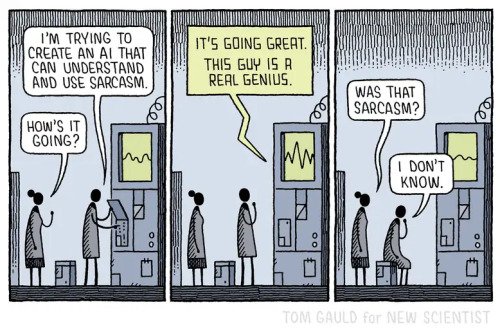
Congratulations @iamtoto! You have completed the following achievement on the Hive blockchain and have been rewarded with new badge(s):
Your next payout target is 50 HP.
The unit is Hive Power equivalent because your rewards can be split into HP and HBD
You can view your badges on your board and compare yourself to others in the Ranking
If you no longer want to receive notifications, reply to this comment with the word
STOPTo support your work, I also upvoted your post!
Support the HiveBuzz project. Vote for our proposal!
I love the focus on AI.
It's especially current because i just read "Do androids dream of electric sheep". i was especially impressed by the idea that all life must violate itself in order to live. Will it ever be possible to say that AI will take on a ghostly consciousness of its own? I wonder if the first sparks of that consciousness are already firing in the vast networks of the GTP series AI that is currently available.
I am especially interested by this because it embodies a huge database of information that is being guided by machine learning algorithms to learn about itself and find patterns. i see the whole thing as a reflection of the vast knowledge of the collective humanity.